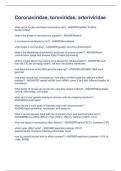Coronaviridae - Study guides, Class notes & Summaries
Looking for the best study guides, study notes and summaries about Coronaviridae? On this page you'll find 13 study documents about Coronaviridae.
All 13 results
Sort by
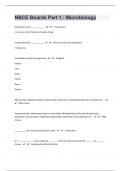
-
NBCE Boards Part 1 - Microbiology 299 Questions) With 100% Correct And Complete Answers| Sure Success| 39 Pages
- Exam (elaborations) • 39 pages • 2024
- Available in package deal
-
- $9.99
- + learn more
Eukaryotes have a ___________. - ️️True nucleus I.e. Human cells, Protozoa, Amoeba, Fungi Prokaryotes have ___________. - ️️No true nucleus (no organelles) I.e. Bacteria Classification system for organisms - ️️Kingdom Phylum Class Order Family Genus Species Adenoviridae, Papillomaviridae, Herpesviridae, Poxviridae, & Hepadnaviridae are all examples of... - ️️DNA viruses Paramyxoviridae, Orthomyxoviridae, Coronaviridae, Rhabdoviridae, Filoviridae, Bunyaviridae...
Coronaviridae.
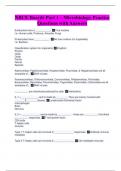
-
NBCE Boards Part 1 – Microbiology Practice Questions with Answers
- Exam (elaborations) • 23 pages • 2024
-
Available in package deal
-
- $10.99
- + learn more
Eukaryotes have a ___________. True nucleus I.e. Human cells, Protozoa, Amoeba, Fungi Prokaryotes have ___________. No true nucleus (no organelles) I.e. Bacteria Classification system for organisms Kingdom Phylum Class Order Family Genus Species Adenoviridae, Papillomaviridae, Herpesviridae, Poxviridae, & Hepadnaviridae are all examples of... DNA viruses Paramyxoviridae, Orthomyxoviridae, Coronaviridae, Rhabdoviridae, Filoviridae, Bunyaviridae, Reoviridae, Picornaviridae, To...

-
Biotechnology & Biotechnological Equipmen
- Exam (elaborations) • 30 pages • 2024
-
- $16.49
- + learn more
The virus that shook the world: questions and answers about SARS-CoV-2 and COVID-19 Radostina Alexandrovaa, Pencho Beykova,b, Dobrin Vassilevc, Marko Jukicd,e and Crtomir Podlipnikf aDepartment of Pathology Institute of Experimental Morphology, Pathology and Anthropology with Museum, Bulgarian Academy of Sciences, Sofia, Bulgaria; bFaculty of Chemistry and Pharmacy, Sofia University “St. Kliment Ohridski”, Sofa, Bulgaria; c“Alexandrovska” University Hospital, Medical University...
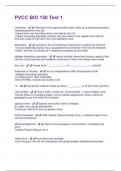
-
PVCC BIO 150 Test 1 Questions and Answers 100% Solved correctly
- Exam (elaborations) • 12 pages • 2024
- Available in package deal
-
- $7.99
- + learn more
Uncoating - ️️-Removal of the capsid (protein layer made up of capsomere protein), releases genome in the cell -Capsomeres may be broken down and used by the cell -Capsid not always degraded, proteins may be present in the capsid to be used as enzymes inside of host cell in the viral replication cycle Adsorption - ️️-process of the virus binding or sticking to a surface of a host cell -Virus coincidentally bumps into a susceptible host cell-binds if the host tell receptors "mat...
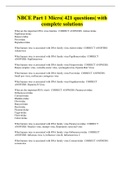
-
NBCE Part 1 Micro| 421 questions| with complete solutions
- Exam (elaborations) • 32 pages • 2023
-
Available in package deal
-
- $12.99
- + learn more
What are the important DNA virus families CORRECT ANSWERS: Adenoviridae Papillomaviridae Herpesviridae Poxviridae Hepadnaviridae What human virus is associated with DNA family virus Adenoviridae CORRECT ANSWERS: Adenovirus What human virus is associated with DNA family virus Papillomaviridae CORRECT ANSWERS: Papillomavirus What human virus is associated with DNA family virus Herpesviridae CORRECT ANSWERS: Herpes simplex virus, varicella-zoster virus, cytomegalovirus, Epstein-Bar...
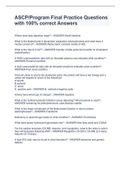
-
ASCP/Program Final Practice Questions with 100% correct Answers
- Exam (elaborations) • 21 pages • 2023
-
Available in package deal
-
- $14.49
- + learn more
Where does lipid digestion begin? - ANSWER-Small intestine What is the fastest band in lipoprotein separation electrophoresis and what does it mostly consist of? - ANSWER-Alpha band; consists mostly of HDL What is the role of LCAT? - ANSWER-transfer of fatty acids from lecithin to cholesterol (esterification) A HIGH urea/creatinine ratio with an elevated plasma urea indicates what condition? - ANSWER-Prerenal condition A high urea/creatinine ratio with an elevated creatinine indicate...
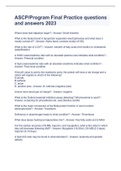
-
ASCP/Program Final Practice questions and answers 2023
- Exam (elaborations) • 21 pages • 2023
-
- $13.49
- + learn more
Where does lipid digestion begin? - Answer- Small intestine What is the fastest band in lipoprotein separation electrophoresis and what does it mostly consist of? - Answer- Alpha band; consists mostly of HDL What is the role of LCAT? - Answer- transfer of fatty acids from lecithin to cholesterol (esterification) A HIGH urea/creatinine ratio with an elevated plasma urea indicates what condition? - Answer- Prerenal condition A high urea/creatinine ratio with an elevated creatinine indi...
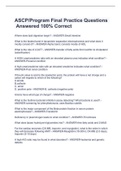
-
ASCP/Program Final Practice Questions Answered 100% Correct
- Exam (elaborations) • 21 pages • 2023
-
- $13.29
- + learn more
Where does lipid digestion begin? - ANSWER-Small intestine What is the fastest band in lipoprotein separation electrophoresis and what does it mostly consist of? - ANSWER-Alpha band; consists mostly of HDL What is the role of LCAT? - ANSWER-transfer of fatty acids from lecithin to cholesterol (esterification) A HIGH urea/creatinine ratio with an elevated plasma urea indicates what condition? - ANSWER-Prerenal condition A high urea/creatinine ratio with an elevated creatinine indicate...
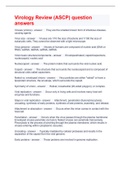
-
Virology Review (ASCP) question answers
- Exam (elaborations) • 14 pages • 2023
-
Available in package deal
-
- $18.19
- + learn more
Virology Review (ASCP) question answers Viruses (virions) They are the smallest known form of infectious disease-causing agents. Virus size Viruses are 1/10 the size of bacteria and 1/100 the size of eukaryotic cells. They cannot be observed with a light microscope. Virus genome Viruses of humans are composed of nucleic acid (DNA or RNA): ssDNA, dsDNA, ssRNA, dsRNA. Virion basic structure/components Enveloped/naked, capsid/capsomers, nucleocapsid, nucleic acid Nu...

$6.50 for your textbook summary multiplied by 100 fellow students... Do the math: that's a lot of money! Don't be a thief of your own wallet and start uploading yours now. Discover all about earning on Stuvia

